Al-so hem-selve suffren muche hunger,
And we in winter-tyme, with wakynge a nyghtes
To ryse to the ruel, to rocke the cradel,
Bothe to karde and to kembe, to clouten and to washe,
To rubbe and to rely, russhes to pilie,
That reuthe is to rede, othere in ryme shewe
The we of these women that woneth in cotes.
It is an old over-true tale, a tale not told by Chaucer. Pity for the poor, earnest, clear-sighted, not to be controlled, is the most admirable point in the nature of Langland. He returns to his complaint that men give gifts and gold to minstrels, while the poor suffer cold and hunger, and "lollers" (idle "loafers"), gain money in the abused name of Charity. Yet the poet is not so revolutionary as to attack the Game Laws! In irony or in earnest, he bids Lords to hunt every day in the week but Sunday, to hunt foxes, wolves, and other beasts. That is what Lords are fit for; it amuses them, and is of service to the farmer. Bishops are the cause of most of the mischief: "their dogs," the priests, "dare not bark". With Knox, two centuries later, the bishops themselves are the "dumb dogs".
The dream ends, another begins about Do-well, Do-better, Do-best. Do-well (good conduct) is better than Indulgences, as Luther preached later. The poet sets off on the quest of Do-well, who has a castle somewhere. The poet rather leans to heresy when he introduces the Emperor Trajan, boasting that, though a heathen, he was saved "without singing of Mass To Trajan he keeps returning. "Reason rules all beasts, but not men, and why not?" Reason declines to answer.
Finally, after giving a summary of Christian morals, the Plowman vanishes away: he returns later, but, whoever comes or goes, the sermons and the satire go on for ever with the same illustrations. The friars are drubbed from end to end, and when at length the narrator awakes, he finds things just as they were, while Conscience goes off to seek Piers Plowman.
Probably the most famous and singular part of the poem is the reappearance of Piers Plowman, or of One like him, riding on an ass, barefoot, without spurs or spear, but looking like a knight. Faith peers forth from a window, and cries, "Ah, son of David!" as heralds do when knights ride to tournaments. Jesus is to joust with Satan: then the crucifixion is described, and the terror of Satan, who calls his forces out, places his bronze guns, and orders calthrops to be thrown on the ground under the walls of his castle. 1The idea of the guns was used by Milton, in a lapse of his genius, in "Paradise Lost".
The conclusion is that Righteousness and Peace kiss each other; the dreamer awakes, for the last time, and with Kytte his wife, and Kalote his daughter, creeps to the Cross, and gives thanks for the Resurrection.
It may be remarked that the style of "Piers Plowman" could be easily imitated; any man who chose could prolong a poem so lacking in organization and plan. Consequently, in compliance with the habit of contradicting all tradition and denying to authors the books with which they have from the first been credited, efforts are made to prove that much of "Piers Plowman" is the work of other hands; not of the author of the shortest and earliest version A. In this case critics discover "differences in diction, in metre... in power of visualizing objects and scenes presented, in topics of interest to the author and in views on social, theological, and various miscellaneous questions". 2
The other, the usual theory, is that the author kept adding to and altering his poem through some thirty years. In that time new topics would interest him; his views on all questions would change with his moods; his alterations, meant for the better, might turn out for the worst (as in the case of Wordsworth and other poets); and his powers, of course, would not always be at the same level.
It is true that the first eight passus , or cantos, or books of version A are more distinct, better organized, more consecutive, more brilliant than the rest of the book; while passus IX-XII, are perhaps more allegorical and less orderly; more vague, more controversial, and one John But is said "to have made this end, because he meddles with verse-making". The author of B is supposed to be a new hand, working over and altering the A version of his predecessor, and often misunderstanding him, while C misunderstands B. It is quite certain that in some MSS. of the fifteenth century the whole poem is attributed to William Langland (or Langley?), and also that the whole poem at its longest, was composed between 1362 and 1392 and was very popular because it turned over and over, in every light, all the political, social, and theological problems that vexed the minds of men. Whether it is all by one hand or not' is a question of very little importance. Many men could have written various parts of it.
Most can raise the flowers now,
For all have got the seed.
The poem retains an historical value which would not be diminished if much of it were cut out. In style it led nowhere; the rather careless versification, the ancient unrhymed alliterative rhythm were doomed to disappear. The moral advice was wasted on Lancastrian England, which rushed into the madness of the fifteenth century; the burning of Lollards; the attempt to conquer France—as vain as unjust,—the burning of Joan of Arc; the twenty years of defeat and disgrace which followed and avenged that crime; the fury of the Wars of the Roses, the butcheries, the murders, and, accompanying all this, the dull prolix stuff that did duty for poetry and literature.
Chaucer's other prominent contemporary "the moral Gower," in Chaucer's own phrase, was a far more commonplace character than Langland. John Gower was entitled to write himself Esquire, and owned lands in Norfolk and Suffolk; he died in 1408, and his tomb, with his three great books under his head, exists in St. Saviour's church, in Southwark. Chaucer was a friend of Gower and, during one of his missions abroad, left Gower in charge of his affairs. At the close of "Troilus and Criseyde" he writes:—
O moral Gower, this book I directe
To thee, and to the philosophical Strode,
To vouchen-sauf, ther nede is, to correcte.
Strode is unknown, and we need not examine conjectures about him. Gower was not ungrateful for Chaucer's compliment, and in the earlier version of his "Lover's Confession" ("Confessio Amantis") he repaid it, very prettily. Venus bids Gower's poems greet Chaucer well "as my disciple and my poet, who, in his youth filled the land with ditties and glad songs which he made for my sake". This passage was later omitted by Gower: who, it has been suggested, was annoyed by some words in the Prologue to the Man of Law's Tale (in Chaucer's "Canterbury Tales"). At the same time, Gower may have removed the compliment to Chaucer merely to make room for more matter. If not, literary people have quarrelled bitterly over smaller things than the criticism by the Man of Law.
With Gower's French and Latin poems we have little to do. His Fifty Ballades, in French, to his lady, are very pleasing examples of that old formal verse, with its difficult rhymes; and but for the grammatical liberties which the Anglo-French writer took, would secure for Gower a high place among the French versifiers of his age.
In French he wrote "Le Mirour de l'Omme," "Man's Mirror," which has a curious history. 3
The "Mirour," in French, and the "Speculum" in Latin, deal allegorically with virtues, vices, and the way of salvation; they contain many stories from all quarters, which are retold by Gower in English, in his immense "Lover's Confession".
In his Latin "Vox Clamantis" (1381) ("The Voice of one crying") and in his "Mirour de l'Omme," but especially in the former, Gower had given his testimony against the sins of the age, and had impartially rebuked all sorts and conditions of men. He described the peasant rising, under Wat Tyler and others, of 1381, exculpating King Richard, who was only a brave boy. But, as time went on, and dissatisfaction increased, Gower turned from Richard, and, very early, to the son of John of Gaunt, later Henry IV. Gower transferred his affections so early to Henry, that it would be unfair to call him a venal turncoat: he saw no hope for English liberty except in the Lancastrian cause.
Читать дальше












